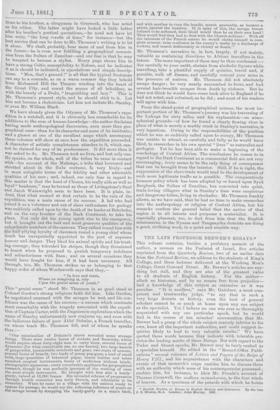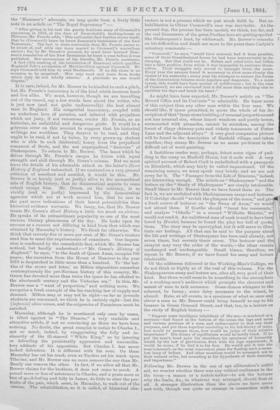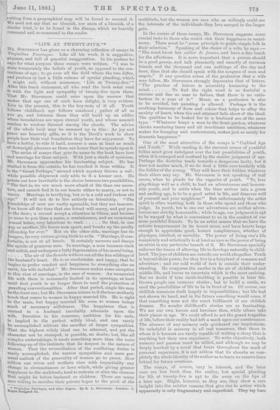THE LATE PROFESSOR BREWER'S ESSAYS.* This volume contains, besides a
prefatory memoir of the author, a sermon on the Psalmist of Israel, five articles reprinted from the Quarterly Review, two of an earlier date from the National Review, an address to the students of King's College, and three lectures delivered at the Working Men's College, Great Ormond Street. Mr. Brewer's articles are any- thing but dull, and they are also of the greatest value
to all students of English history. For the author— albeit no historian, and by no means free from prejudice— had a knowledge of this subject as extensive as it was peculiar. " It is needless," says Mr. Gairdner, a most com- petent and trustworthy judge, " to say that in such a very large domain as history, even the best of general scholars cannot be so much at home upon any one subject as the specialist. Yet I believe no one was ever so thoroughly acquainted with any one particular epoch, but he would find in the course of ten minutes' conversation that Mr. Brewer had a grasp of the whole subject scarcely inferior to his own, knew all the important authorities, and could suggest in- quiries likely to lead to very valuable results." We have quoted these words because they indicate with tolerable pre- cision the leading merits of these Essays. But with regard to the Tudor and Stuart epochs, Mr. Brewer may be fairly ranked as a specialist himself. He edited in the " Record-Office Publi- cations" several volumes of Letters and Papers of the Reign of Henry VIII., and his acquaintance with the characters and events of that monarch's reign enables him to discuss them with an authority which none of his contemporaries possessed ; enables him, for instance, to blow Mr. Froude's account of Thomas Cromwell, the malleus monachorum, to the four winds of heaven. As a specimen of the petards with which he hoists • English Studios, or Essays in English History and Literature. By the Into J. S. Brewer, M.A. Loudon : John Murray. 1881. the Hammer's advocate, we may quote from a lively little note in an article on " The Royal Supremacy " :—
" After giving in his text tho purely fictitious story of Cromwell's appearing, in 1515, at the door of Frescobaldi's banking-house at Florence, Mr. Froude adds, This noticeable fact further shows itself, that he (Cromwell) knew by heart Erasmim's translation of the Now Testament.' The fact is more noticeable than Mr. Froude seems to be aware of, and adds one more marvel to Cromwell's marvellous career ; fur, by Mr. Froude's account, ho mast have learned Eras- mus's translation of the New Testament by heart a year before it was published. But unconscious of his blunder, Mr. Froudo continues, ' A fact (this reading of the translation of Erasmus) which qualifies Reginald Pole's accusation of Machiavollism against Cromwell. He says Cromwell told him to read Machiavelli. If ho did, there is no occasion to bo surprised. Men may read and learn from books which thdy do not wholly admire.' A platitude no one would dispute."
It is rare, indeed, for Mr. Brower to be kindled to such a pitch, but Mr. Froude's inaccuracy is of the kind which incenses lamb and lion alike. We must, however, though we are travelling out of the record, say a few words here about the writer, who is just now (and not quite undeservedly) the best abused man in England. His congenital inaccuracy, coupled with an audacious love of paradox, and infected with prejudices which arc juicy, if not venomous, render Mr. Fronde, as an historian, an unfaithful and dangerous guide. It would be a grievous error on this account to suppose that his historical writings are worthless. They deserve to be read, and they ought to be read, if not by babes, by every grown-up student who is able to suck (historical), honey from the prejudiced romances of Scott, and the not unprejudiced " histories" of Shakespeare. To return to Mr. Brewer. The lance which he drives through Mr. Froude's casque he drives with equal strength and skill through Mr. Green's cuirass. But we must leave the details of his admirable attack on the latter's Short History of England untouched. If we ventured on a very general
criticism of assailant and assailed, it would be this. Mr. Brewer is so keenly (and so justly) alive to the monarchical 'side of English history, that its democratical aspects to some extent escape him. Mr. Green, on the contrary, is so vividly (and so justly) impressed by the democratical agencies which are at work around him, that he sees in the past more indications of their latent potentialities than historical evidence warrants. We fancy, too, that Mr. Brewer treats Mr. Green's Short History a little too much au serieux. He speaks of its extraordinary popularity as one of the most curious literary phenomena of the day. Ho looks upon its success as a success not differing in kind from that which was obtained by Macaulay's history. We think far otherwise. We think that seventy-five or more per cent. of Mr. Green's readers read him to meet the requirements of examiners. Our impres- sion is confirmed by the remarkable fact, which Mr. Brewer has noticed, but hardly understood :—" Mr. Green's -History of England," he says, " to the death of Queen Anne, occupies 700 pages ; the narration from the House of Hanover to the year 1873 is despatched in little more than a hundred. To the bat- tles of the crows and kites,' as Milton stigmatises somewhat contemptuously the pre-Norman history of this country, Mr. Green has devoted more than twice the space he has allotted to the nineteenth century and the Victorian era." In this, Mr. Brewer sees a " want of proportion," and nothing more. We recognise a fresh example of the far-reaching law of supply and demand. Milton may or may not be right—so far as juvenile students are concerned, we think he is entirely right—but Dis
[infernie] alter vision, and the exigencies of Examiners must be satisfied.
Macaulay, although he is mentioned only once by name, is tilted against in "The Stuarts," a very readable and attractive article, if not so convincing as those we have been noticing. No doubt, the great essayist is unfair to Charles I., not so much, indeed, by exaggerating the folly and in- sincerity of the ill-starred " White King," as by ignoring or defending the persistently aggressive and unconcilia- tory attitude of his opponents. But Charles I. has never lacked defenders. It is different with his sons. On them Macaulay has set his mark, even as Tacitus set his mark upon Tiberius, and Mr. Brewer can no more remove the one than Mr. Beesly can remove the other. In fact, if we allow all that MT. Brewer claims for the brothers, it does not come to much. A pound more or less of astuteness in Charles, and a grain more or less of good-feeling and folly in James, do little to alter the por- traits of the pair, which seem, in Macaulay, to walk out of the canvas. The rehabilitation, as it is called, of historical cha-
racters is not a process which we put much faith in. But re- habilitation in Oliver Cromwell's case was inevitable. At the present day, the process has been carried, we think, too far, and the real lineaments of the great Puritan hero are getting spoiled like Shakespeare's bust, by whitewash. Mr. Brewer's remarks on his difficulties and death arc more to the point than Carlyle's minatory comments :—
" Cromwell," ho says, "would have restored, had it been possible, some of those Constitutional forms he had boon instrumental in de- stroying. But that could not be. Rulers and ruled alike had fallen into a false position, from which it was impossible to extricate them- selves. Their struggles only served to entangle them the more. Every year the usurper found it necessary to rivet more closely the chains of his authority ; every year his attempts to restore the forms of the Constitution became more hopeless and desperate. To a mere tyrant, this would have been matter of indifference ; but in the case of Cromwell, we are convinced that it did more thin anything else to embitter his days and break his heart."
As might have been expected, Mr. Brewer's article on "The Record Office and its Contents" is admirable. He knew more of this subject than any other man within the four seas. We should like, if space permitted, to quote the whole of his de- scription of that " large stone building, of unusual proportions and not less unusual size, whose lancet windows and portly tower, surmounted with pinnacles, cannot be mistaken, among the forest of dingy chimney-pots and rickety tenements of Fetter Lane and the adjacent alleys." A very good companion picture will be found in the description of Hatfield village, and taken together, they stamp Mr. Brewer as no mean proficient in the difficult art of word-painting.
A fastidious reader may, perhaps, detect some signs of pad- ding in the essay on Hatfield House, but it ends well. A very
spirited account of Robert Cecil is embellished with a panegyric on Elizabeth, which may fairly be called impassioned. Of the remaining essays, we must speak very briefly, and we are not sorry for it. The " Passages from the Life of Erasmus,"indeed, are interesting enough. The article on " Shakespeare " and the lecture on the " Study of Shakespeare " are simply intolerable.
Small blame to Mr. Brower that we have found them so. The fact is, we are surfeited with Shakespearean essays and lectures. If Coleridge should " revisit the glimpses of the moon," and giv a fresh course of lectures on " the Swan of Avon," we wool not attend them. If Goethe should "burst his cerements,' and analyse " Othello " in a second " Wilhelm Meister," w would not read it. An unlettered man of rank is said to have bee bored by Harald, because he found the play too full of quota tions. The story may be apocryphal, but it will serve to illus A trate our feelings. All that can be said to the purpose abou the life and writings of Shakespeare has been said already, no seven times, but seventy times seven. The lecturer and th essayist may vary the order of the words,—tho ideas remain unchanged and unchangeable. Small blame, therefore, we repeat, to Mr. Brewer, if wo have found his essay and lecture intolerable.
Of the addresses delivered at the Working-Men's College, we do not think so highly as of the rest of this volume. For the Shakespearean essay and lecture are, after all, very good of their kind. But there would seem to be something in the atmosphere
of a working-men's audience which prompts the cleverest and sanest of men to talk nonsense. Some demon whispers to the soberest, be funny ; some fairy murmurs to the wisest, be
absurd. Here, at all events, is a specimen of what so sane and. clever a man as Mr. Brewer could bring himself to say to his beavers in Great Ormond Street, and that, too, iu a lecture on the study of English history :-
" Suppose some intelligent inhabitant of the sea—a mackerel or a morman—had found at the bottom of the ocean the legs and firma and various portions of a man, and endeavoured to find out their purposes, and put them together according to his fish-theory of man; how would ho arrange them, how would he judge of their relative importance ? His theory of equilibrium would be sorely tried. If he put the man's head upon his shoulders, his specimen of humanity would, by the law of gravitation, float with his legs uppermost; it would be worse, if he tied it to his feet. He would put it into the man's stomach, as the most convenient place for floating such a sense- less lump of ballast. And other members would be arranged, not in their natural order, but according to his hypothesis of their meaning and importance."
Following Mr. Brewer in the use of apt alliteration's artful
aid, we wonder whether there was any critical craftsman in the the room—a mason or a match-maker—to ask the lecturer why the limbs, &c., in whatever way arranged, should float at all. A stranger illustration than the above we have never met with, though one quite as strange in connection with a
„Tutting from a geographical map will be found to succeed it. We need not say that no blemish, nor atom of a blemish, of a similar kind, is to be found in the Essays, which we heartily commend and re-commend to the reader.






























 Previous page
Previous page